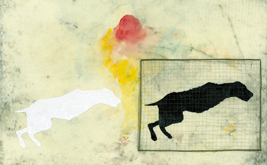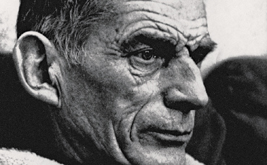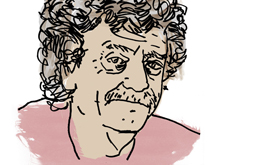Occupy This Album Occupy This Album
A new collection featuring ninety-nine tracks of class-conscious music from ninety-nine artists.
May 17, 2012 / Books & the Arts / Peter Rothberg

Blind Spot: On Christa Wolf Blind Spot: On Christa Wolf
A postwar German novelist’s complicated legacy.
May 16, 2012 / Books & the Arts / Holly Case

The Ravaging Nothing: On László Krasznahorkai The Ravaging Nothing: On László Krasznahorkai
Satantango will devour you, you and everything you know.
May 16, 2012 / Books & the Arts / Ben Ehrenreich

Mother Natures: On Elisabeth Badinter Mother Natures: On Elisabeth Badinter
In The Conflict, the French intellectual takes American mothering to task.
May 16, 2012 / Books & the Arts / Jennifer Szalai

Love, Sam: On the Letters of Samuel Beckett Love, Sam: On the Letters of Samuel Beckett
Samuel Beckett wants you to have a less bad day.
May 16, 2012 / Books & the Arts / Aaron Thier
The Road to Hi Hat The Road to Hi Hat
Sunrise hurt the cat-owl’s eyes. Crows go to ground in the slim valley. Past Hard Shell, around through Softshell’s barnless swallows. Transhumance older than the hills: Up the mountain in May to see the spindly sourwood flowers. Down in the fall with the firelit honey. Even the river stones show early autumn: wet scarlet, sugar-maple bronze.
May 16, 2012 / Books & the Arts / Merrill Gilfillan
Cradle Knoll Cradle Knoll
All the bloodhounds in the world touch down. Wardens come from miles around. Last night a lazy dream, footage of a full range tossing under storm, wild zydeco wind up from the south via Hurricane Gap, leaves in the air, gullies surging, foaming brick-red— Van Gogh’s hair, sickle-cut, or General Sherman’s. Grouse drum on hazy ridges. Down the road a place called Muses Mills. White-throated sparrows sing their whisper-song. All the bloodhounds in the world can’t pin it down.
May 16, 2012 / Books & the Arts / Merrill Gilfillan

‘I Was There’: On Kurt Vonnegut ‘I Was There’: On Kurt Vonnegut
Kurt Vonnegut sought to fool us with his eyes wide open.
May 16, 2012 / Books & the Arts / William Deresiewicz
Why the Friendship Segregation on HBO’s ‘Girls’ Speaks to a Bigger Problem Why the Friendship Segregation on HBO’s ‘Girls’ Speaks to a Bigger Problem
For all our talk about the multiracialism of the millennial generation, the lack of interracial social connections is more than a coincidence.
May 10, 2012 / Books & the Arts / Salamishah Tillet

Jazz Fest and the Ghosts of New Orleans Jazz Fest and the Ghosts of New Orleans
In a city divided by extremes, the festival brings together all kinds of people to cook up something marvelous.
May 9, 2012 / Books & the Arts / Eric Alterman
